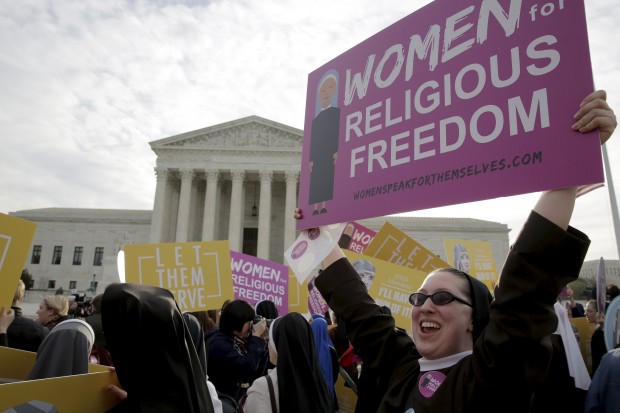WASHINGTON (CNS) — In the end, the women religious decided it would be good to sing after all.
That wasn’t on the agenda for the sunny 90-minute rally in front of the Supreme Court March 23 in support of the plaintiffs in Zubik v. Burwell. But it had a calming effect, so it seemed like the right thing to do.
There were several spontaneous renditions of “Let There Be Peace on Earth,” “God Bless America” and “God Bless the USA” from the Little Sisters of the Poor and groups of Dominican and Carmelite sisters.
[hotblock]
And at the end of the rally, Mother Regina Marie Gorman of the Carmelite Sisters of Los Angeles, who delivered the closing prayer, decided, with a big smile, that it would be apt for for all the Catholics to chant the Marian antiphon “Salve Regina,” traditionally sung after evening prayers.
“Filling out a piece of paper is not the issue. Complicity is wrong and it is wrong in itself, and the government cannot make this otherwise,” said Dominican sister, Mother Mary Assumpta Long.
It was a serene conclusion to an orderly rally punctuated with chants of “Let them serve!” as the court heard oral arguments in the case brought by several Catholic and other faith-based entities against the federal government’s requirement that most employers, including religious employers, cover contraceptives for their workers.
The Denver-based Little Sisters, who operate nursing homes for the elderly poor, and 36 other groups are contesting the Affordable Care Act’s contraceptive mandate. With the death of Justice Antonin Scalia, the case has an uncertain future with the possibility of a 4-4 court deadlock, which means the rulings of the circuit courts, all but one of which have gone against the plaintiffs, will be upheld.
The Department of Health and Human Services has offered an “accommodation,” also known as a “work-around,” that allows objecting employers to acknowledge their opposition to contraceptive coverage by notifying HHS in a letter. This allows a third party to provide the coverage. The Little Sisters and other plaintiffs object to that, calling it a burden on their free exercise of religion, because they are still involved in allowing coverage they find objectionable.
“Today the Little Sisters make their last stand,” said Mother Mary Assumpta Long of the Dominican Sisters of Mary in Ann Arbor, Michigan.
“Filling out a piece of paper is not the issue. Complicity is wrong and it is wrong in itself, and the government cannot make this otherwise.”
“The Supreme Court,” she continued, “is not the arbiter of sacred Scriptures.”
“Our request is not uniquely Catholic or religious. It’s American,” said Elise Italiano, executive director of communications for The Catholic University of America, another plaintiff.
On March 2, a rally of more than 3,000 participants surrounded and attempted to drown out a pro-life rally of about 200 during oral arguments on a Texas abortion law. This time, the proportions were reversed.
A competing rally organized by the National Women’s Law Center, the American Humanist Association and Catholics for Choice, among other groups, had many fewer participants than the several hundred who turned out in support of the Little Sisters and the other plaintiffs, including Oklahoma Wesleyan University, East Texas Baptist University, Southern Nazarene University and Geneva College, a Presbyterian institution, and the Archdiocese of Washington, the dioceses of Pittsburgh and Erie, Pennsylvania and Priests for Life.
PREVIOUS: New York high school teacher among scientists who ‘heard’ sound in space
NEXT: Youth and young adults ready for Holy Week activities



I agree that the Supreme court does not rule on the laws of God but on the laws of man. However I wonder how the government can function if anyone can opt out of compliance by saying it conflicts with their religious beliefs.I remember when I was a kid growing up in Philadelphia some of my friends were not allowed to go to the movies on Sunday because their parents felt that doing so did not keep the Sabbath holy. However those parents did not appeal to the courts to make it illegal for anyone to go to the movies on Sunday.